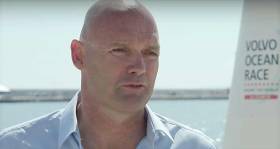Displaying items by tag: Mark Turner
Mark Turner Video on Quitting the Volvo Ocean Race
Volvo Ocean Race CEO Mark Turner has spoken out about last month's decision to leave the race just weeks before it starts in Alicante. Turner also talks in the video below about how the proposed 2019-20 Volvo Ocean Race in new boats would not now take place.
In a video (released through the Volvo Ocean Race), Turner admits that he essentially failed to get signatures on the dotted line in time to be able to move forward with racing in new boats for 2019-20.
See the video below:
Mark Turner On Sorting Out The Dinghy/Olympic Sailing World
Mark Turner, the new CEO of the Volvo Ocean Race, has released his notes for a presentation to the ISAF Conference back in 2013 (now World Sailing) on how to develop the dinghy/Olympic sailing world to take it up a level.
Turner never gave the presentation. It is reported this morning by Scuttlebutt that just half an hour before he was due to speak, the ISAF Executive Committee for a reason he was never given directly or openly, decided to pull it.
Now Turner has released the content in a blog that can be accessed on Sailweb here. It makes interesting reading in the context of World Sailing's upcoming decisions on classes for Tokyo 2020 as has already been reported by Afloat.ie here.
Mark Turner Appointed Volvo Ocean Race CEO
Mark Turner has been appointed Volvo Ocean Race CEO, stepping down after 23 years at the helm of global sports marketing company OC Sport.
The Briton, who competed in offshore sailing’s leading international event as a Whitbread Round-the-World sailor in 1989, and masterminded the Dongfeng Race Team project in the 2014-15 edition, will take up his new position in succession to Knut Frostad from June 7 this year.
Turner, 48, said: “There probably isn’t any other post in sailing that could have attracted me today after taking OC Sport through so many different areas of the sport over the last two decades.
“It is a significant responsibility for me to take over the leadership from Knut, who has done such an excellent job of transforming the race in to the sport’s biggest and most commercially viable top-level event.
“As the race with the most significant global footprint in both media and business-to-business terms, and a fascinating history dating back to 1973, there is a huge responsibility not only to the numerous stakeholders, Volvo, and the other team and event partners, but also to the sport of sailing in general. It’s a platform that can really help shape the future of the sport.
“I certainly hope I can add some value and vision to the excellent work of the great team already in place in Alicante, and through that, help to inspire and engage more and more fans, sailors and sponsors, in the future.”
Henry Stenson, chairman of the Volvo Ocean Race board, said he was delighted with the appointment.
“It has been a long and thorough process, but I know that in Mark we have found the right person to take on this very challenging role,” he said.
“We need a man with the expertise, determination and vision to take the event to the next stage after all the great work done by Knut, and Mark has all these attributes in abundance. The future under his guidance looks very exciting indeed.”
Turner has competed in many of the sport's leading events including the Transat Jacques Vabre and the Mini Transat, but really made his name in the sport by masterminding Briton Ellen MacArthur’s successful Vendée Globe race in 2001 when she finished second.
He then oversaw her breaking the solo circumnavigation of the world record in 2005, taking the sport to a wider audience than ever before, both in their native United Kingdom, but also around the world.
Turner went on to launch the very successful Extreme Sailing Series with OC Sport as well as many other leading adventure sports events.
He added: “My personal chapter with OC Sport is now ending, but the spirit and achievements will continue, I’m sure, with the strong team I’m leaving behind.
“It has been an honour to work with so many motivated and talented people over the years, and to have been able to use the sporting platforms we’ve created to inspire people from all walks of life.
“OC Sport has enabled me to challenge the norm and innovate in many areas – something that I’m sure the company will continue to strive to do.”
Turner has stepped down fully from OC Sport as both board director and shareholder.
Turner, who is also a very keen cyclist, swimmer and skier, will now undertake a period of leave before taking up his new responsibilities with the race, ahead of the 13th edition in 2017-18 which starts in October next year.
Short biography
Born: Isle of Wight, England in July 1967
1985-90 – Lieutenant, Seaman Officer, Royal Navy
1989-90 – Competed in Whitbread Round the World Race on British Defender
1989-92 – Operations, Sales and Marketing Director, Winning Winches
1992-98 – Marketing Director, Spinlock
1993-2016 – Founder and Executive Chairman, OC Sport
June 2016 – CEO, Volvo Ocean Race































































